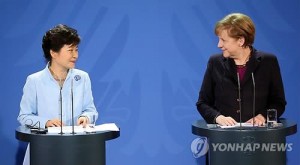Special to WorldTribune.com
By Donald Kirk, East-Asia-Intel.com
The people who write for the Korean Central News Agency in Pyongyang must be having fun. How else can you account for some of the great turns of phrase that show up in the English-language versions of their harangues?
It wasn’t enough that the KCNA quoted an otherwise unidentified military official as saying some “boneheads” in Seoul had forgotten that Yeonpeyong Island was “smashed by our military’s bolt of lightning” in 2010.

In the same breath, almost, someone at KCNA was describing the ongoing U.S.-South Korean war games as “madcap nuclear war exercises.”
“Bonehead?” “Madcap?” When was the last time anyone heard these words used? Does North Korea have a whole team of writers dreaming up this stuff or is some ace writer, one person, called on to look for the perfect insult?
Whoever he or they are, the words are a throwback to a previous era, culled from a dictionary of English slang whenever deemed by definition to be most appropriate.
The invective gets better when KCNA writers start making personal attacks on people they really don’t like. For quite a while the impression was that President Park Geun-Hye was showing signs of rapport with North Korea.
Might she reverse the pattern of her predecessor, President Lee Myung-Bak, so despised and reviled by Pyongyang?
Don’t count on Ms. Park doing any better.
Those writers at KCNA pulled still more phrases out of their grab bag, denouncing her as both “a freakish old maid” and “a frog in the well” after she made the terrible mistake of offering to shower the North with a bonanza of just about any kind of aid they might want.
Memories are short. Most people forget that Lee Myung-Bak offered a windfall in aid soon after his inauguration in 2008, only to have North Korean strategists discard the offer as an “insult” and worse.
Park’s offer seemed a little better. For one thing, she made it not in Seoul but in the German city of Dresden. Both the country and the city are significant — Germany as the great central European power, vanquished in war, divided between the communist east and the capitalist west, now reunited and again Europe’s strongest country.
And Dresden? The world may have forgotten, but Dresden in the winter of 1945 was the target of horrendous fire-bombings mostly by U.S. and British planes in which 25,000 people, by minimal estimate, were killed.
Would anonymous North Korean analysts, some of them no doubt highly versed in history, probably not the same guys who pull all those weird phrases out of their slang dictionary, have been unaware of the parallel between the fire-bombing of Dresden and that of Pyongyang and other North Korean cities during the Korean War?
Park herself may have considered the parallel but evinced no clue about her knowledge of World War II history as she pronounced what she called the “Dresden doctrine.”
For public consumption, all she wanted to do was to evoke memories of the destruction of the Berlin Wall and the reunification of East and West Germany, saying “We too must tear down barriers.”
Like Lee, however, Park tied a potential bonanza for North Korea to a familiar condition. Ah, that was the catch! If North Korea would only “forgo its nuclear program,” she said, South Korea “will offer its active support.”
Think of it — North Korea getting all the aid its leaders could wish for and then joining the international financial system via the good offices of a fictional Northeast Asia Development Bank.
Nobody should expect this bank to open its doors any time soon, but the prospect of heady economic schemes, with offices in each other’s capitals, has to be alluring.
And then, wouldn’t you know it, North Korea had to pour cold water on the whole grandiose scheme. Not only had Park insulted and undermined “our noble ideology and institutions,” said the Workers’ Party rag, Rodong Sinmun, but she had also “made fun” of North Koreans by proposing to assist homeless kids and impoverished families.
It was in approximately those terms that North Korea began excoriating Lee Myung-Bak after he came out with his proposal for converting the North from a backward country, distinguished only for its nuclear and missile programs, into a modern state. Now it looks as if we’ll have to wait still longer before the dream comes true.
While nuclear-armed North Korea remains mired in hardship and hunger, however, the real beneficiaries of its policies have to be the writers at the Korean Central News Agency.
They’re obviously having a great time larding their English-language translations with the most odious turns of phrase they can find.
If some of the words are outmoded, it’s nice to be reminded of the kind of mudslinging we haven’t heard or seen in print for ages.
Columnist Donald Kirk has been reading North Korean propaganda for years. He’s at kirkdon@yahoo.com.

You must be logged in to post a comment Login